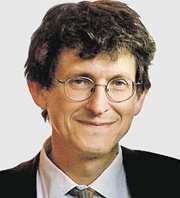Snowden leaks: press irate as Guardian faces grilling
04 Dec 2013
 The editor of Britain's The Guardian newspaper, Alan Rusbridger, faces questioning by a UK parliamentary committee over his newspaper's publication of intelligence documents leaked by former US intelligence analyst Edward Snowden.
The editor of Britain's The Guardian newspaper, Alan Rusbridger, faces questioning by a UK parliamentary committee over his newspaper's publication of intelligence documents leaked by former US intelligence analyst Edward Snowden.
The House of Commons home affairs committee will question Rusbridger as part of its investigation into counter-terrorism, amid claims (mostly by US and UK government authorities) that the newspaper endangered national security by publishing details of US and British spying.
Among his prominent supporters is legendary Watergate journalist Carl Bernstein, who has written a letter of support to Rusbridger.
Bernstein, 69, said Rusbridger's appearance before the parliament committee was a "dangerously pernicious" attempt by British authorities to shift the focus of the surveillance debate from excessive government secrecy in the United States and Britain to the conduct of the press.
"Rather than hauling in journalists for questioning and trying to intimidate them, the (House of) Commons would do well to encourage and join that debate," he added.
Britain's top spy chiefs warned last month that Al-Qaeda and other enemies were "lapping up" Snowden's revelations and were using them to change the way they operate.
The Guardian counters that its stories sparked an important debate about intelligence, privacy and freedom of speech. It insists it has handled all the information sensitively.
The Guardian was among several newspapers that published Snowden's leaks about Britain's GCHQ eavesdropping agency and its close cooperation with the US National Security Agency (NSA) in carrying out mass surveillance.
Bernstein said the conduct of press had been admirable and responsible over the issue. The articles published by The Guardian, The Washington Post and The New York Times based on Snowden's information were no help to terrorists or enemies of the nation, he added.
"You are being called to testify at a moment when governments in Washington and London seem intent on erecting the most serious (and self-serving) barriers against legitimate news reporting - especially of excessive government secrecy - we have seen in decades," he wrote in the letter, which was published on the Guardian website.
"As we learned in the United States during our experience with the Pentagon Papers and Watergate, it is essential that no prior governmental restraints or intimidation be imposed on a truly free press. Otherwise, in such darkness, we encourage the risk of our democracies falling prey to despotism and demagoguery and even criminality by our elected leaders and government officials."
Bernstein's reporting, together with that of Washington Post colleague Bob Woodward, broke the Watergate scandal that eventually resulted in the resignation of US President Richard Nixon in 1974.
He has since continued to focus on the theme of the use and abuse of power through books, magazine articles and television appearances.
A writer in The Guardian commented, ''The astonishing suggestion that this sort of journalism can be equated with aiding and abetting terrorism needs to be scotched decisively. Attacking The Guardian is an attempt to do the bidding of the services themselves, by distracting attention from the real issues. It is the role of a free press to hold governments to account.''


















